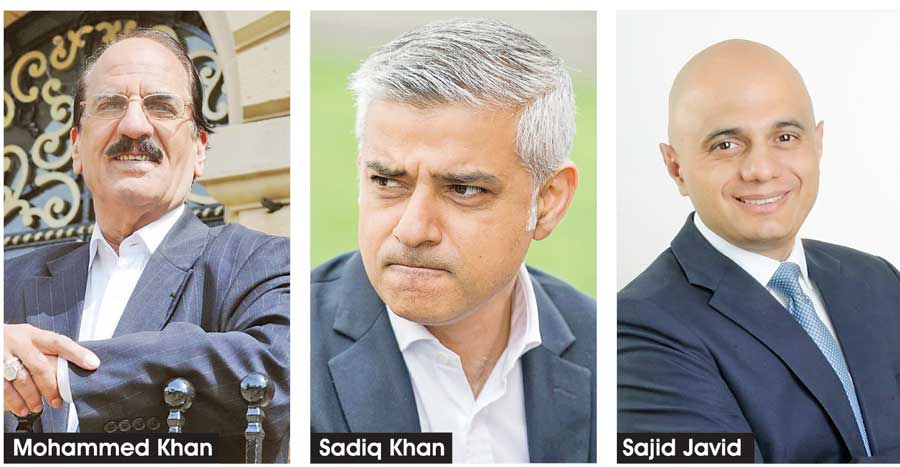ASIA’S ACQUITTAL WELCOMED IN UK
- 10 Nov - 16 Nov, 2018

In British society, the term ‘glass ceiling’ is used very often to denote the invisible barrier that stops certain people from progressing beyond a certain point. It is usually used with regard to the opportunities available to women, who, allegedly, find themselves facing such a ceiling in many corporate bodies, a line beyond which male dominance takes over and women are not allowed to progress.
However, there is a ‘glass ceiling’ that also exists for members of the Black, Asian and Minority Ethnic (BAME) communities. A recent analysis conducted by the Guardian and Operation Black Vote has established that of the 1,049 most powerful people in Britain, just 36 are from ethnic minorities – and only seven of those are women.
Also, only seven are immigrants of Pakistani origin, all of them men. The most prominent of them, of course, is Sajid Javid, the current Secretary of State for Communities and Local Government, a former business secretary, culture secretary and economic and financial secretary to the Treasury. A true loyal Thatcherite if ever there was one, he was once dubbed by the Daily Mail as Maggie’s Muslim heir; when first appointed in government and asked for which picture he would like from the government collection for his office, he is said to have chosen a picture of Mrs Thatcher.

Like most people of Pakistani origin who have risen in life in the UK, Sajid Javid came from very humble origins. It is said that when his father landed in the UK in 1961, he had just £1 in his pocket. Today, that would hardly have bought him a cup of coffee. His father headed north of Rochdale where he worked in a cotton mill, but had set his eyes on obtaining a job as a bus driver. He was rejected many times but was finally successful and worked so hard that he came to be known as ‘Mr Night and Day’!
Sajid perhaps received his work ethic from his father and was a very hard working student. He was the first from his family to go to a university and ultimately made a career for himself in investment banking and became a rich man. Political successes followed.
Another British Pakistani in the list is London Mayor Sadiq Khan. Another self-made man, he too was the son of a bus driver. There must be some lesson imparted by British Transport that makes the children of its employees fare so much better in life than people from much more privileged backgrounds; perhaps it is the art of knowing how to keep the wheels of life running even when the odds are not good.
Be that as it may, Sadiq Khan today holds the most powerful position held by any member of the Labour Party. He was elected by 1.3 million votes, the biggest public mandate any politician has ever received in British history.
The list also includes Humza Yousaf, the Scottish Minister for Transport and the Islands, who created a bit of a stir when he took up his parliamentary oath in both English (albeit with a heavily Scottish accent) and Urdu. Yousaf’s father is of Pakistani origin and his mother came to this country from Kenya.
Others in the list are Sohail Munawar, Labour leader of Slough Council, Muhammed Butt, Labour leader of Brent in north London and Mohammed Khan, Labour leader of Blackburn with Darwen Council in northern England. There is also Tariq Mahmood Ahmad of the Ahmediyya community who is a Tory life peer and has been minister of state from Commonwealth and the UN.
As a list of achievers in a community that has been around, in most cases, for over 50 years and in many cases is well into its fifth generation, that may not be saying a lot. The list is a bit narrow as it seems to restrict itself mainly to people in public life whereas there are entrepreneurs and businessmen in the Pakistani community who have also risen to great heights and who, because of their wealth, enjoy great power. But again, given the yardstick by which such achievements are judged in the UK, there are not too many. All of which means that on the whole, the list of British Pakistanis exercising meaningful power in this country is a modest one.
I have said this before and I will say it again, that one of the main reasons for this is the deep involvement of the huge numbers of Pakistanis settled in the UK in the politics of Pakistan. Little branches of the various Pakistani political parties exist in every nook and corner of this green and pleasant land, making it more green, but rather less pleasant. This is one of the greatest sources of disunity in the Pakistani community and their lack of interest in the politics of the land they have made their home and where their children will grow up and make their lives. But occupying a prominent position in a British branch of some Pakistani political party or the other satisfies most peoples’ desire for recognition, although in the long run, it achieves precious little. The recognition they gain is, of course, limited to their own very narrow community, but that is perhaps all they seek. Some, in their hearts of hearts, may even suspect that that is about as far as they are ever likely to get. In these circumstances the demand that overseas Pakistanis be given the right to vote in Pakistani elections, which is being raised by some political parties in Pakistan, may carry some meaning in the case of Pakistanis living in those countries where they are not given local citizenship or the right to vote in the elections of the country in which they live; but in the case of Pakistanis settled in the UK, giving them the right to vote in elections in Pakistan would not be doing them any favour. •
COMMENTS